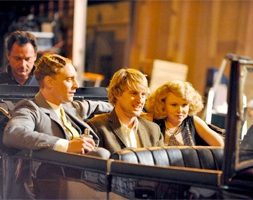Crazy, Stupid, Love
Posted on July 29, 2011 at 9:55 am
This painful comedy about the agonies of love has some deftly observed moments and strong performances but its essential tawdriness overwhelms its efforts to be cuddly and life-affirming.
Everyone is miserably in love with the wrong person. Steve Carell plays Cal, married for almost 25 years to his teenage sweetheart, Emily (Julianne Moore), who tells him in the opening scene that she wants a divorce. Their 13-year-old son, Robbie (Jonah Bobo) is in love with their 17-year-old babysitter, Jessica (the heart-twistingly vulnerable Analeigh Tipton). Jessica has a crush on Cal. Emily slept with her co-worker, David (Kevin Bacon). Cal goes to a bar to drown his sorrows and meets someone who is not miserable and not in love: Jacob (Ryan Gosling), who takes a different beautiful woman home from the bar every night. Jacob tells Cal that he lost Emily because he lost his sense of what it means to be a man. For Jacob, being a man means pitching the New Balance shoes and ill-fitting suits and manipulating women to have sex by pretending to listen to them. Cal is soon channeling his inner playa, first seducing a teacher named Kate (Marisa Tomei in a thankless role) and then a series of montaged lovelies. Meanwhile, Robbie is texting romantic pleas to Jessica and Jessica is following the advice of a classmate and taking nude photos of herself to give to Cal and Emily is dating David, whose role seems to be nice guy whose unfitness for love is demonstrated by everyone’s intended-to-be-funny-but-not-funny-at-all inability to pronounce his last name correctly.
Got that? Then, just as Jacob’s method begins to work for Cal, it stops working for Jacob. The one woman who turned him down is Hannah (Emma Stone), a recent law graduate studying for the bar exam. Circumstances lead her to return to the bar to proposition Jacob and back at his sleek bachelor pad something unprecedented happens — a night of real intimacy, talking and laughing. Now Jacob needs advice on his uncharted territory: how to be a part of a relationship that lasts more than 24 hours.
There’s an inexpressibly lovely moment as Emily calls Cal, not realizing he is right outside their house because he sneaks over at night to maintain the garden (metaphor alert). She tells him she is in the basement trying to restart the pilot light but he can see she is upstairs and just needed an excuse to call. And Stone continues to be one of the most endearingly honest, intelligent, and expressive performers on screen. She shows us how the flurry of mixed emotions she feels that first night with Jacob flicker across her face as she tries to manage her feelings of confidence and fear, longing and logic.
But that is not enough to make up for the smarminess of the story’s assumptions and the characters’ behavior. There’s an excruciating climactic scene in which two of the characters made humiliating public declarations that are intended to be gallant but come off as self-indulgent and completely inappropriate. And other than Hannah, the characters are just not very nice. Jessica keeps telling us she loves Cal because he is such a kind man and great father. Not from what we see. He shows little concern for what his children are going through with their parents’ separation or anything else they are going through. He does not know who his son’s teacher is. And he is awful to the women he sleeps with, which the movie seems to think is fine. When one of them becomes angry at him because he never called her, she is portrayed as shrewish and unreasonable. Jacob, whose only evidence of responsibility or being aware of anyone else’s needs or feelings is his decision to help Cal become a lady-killer, provides very little reason other than hotness for deserving Hannah’s love or making any effort to earn it. The film is as callous toward the one-night-stands who get tossed aside as Jacob and Cal are. There is no suggestion that someone should give them pointers on how to respect themselves enough not to fall for manipulative cads. Even worse is the treatment of the Jessica/Robbie relationship. She is, we are repeatedly told, 17. Taking nude pictures of herself to give to a man is not just seriously bad judgment and a terrible signal to a prospective romantic partner but probably a crime. Giving those pictures to a 13-year-old is portrayed in the film as an act of compassionate generosity when it is not just seriously bad judgment and a terrible mixed message but definitely a crime. The movie is going for a wistful romanticism. For me it was more like a pervy sociopathy.


